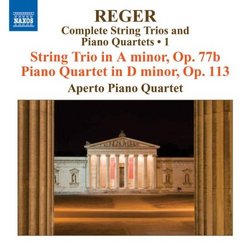| All Artists: Aperto Piano Quartet Title: Reger: Complete String Trios and Piano Quartets, Vol. 1 Members Wishing: 0 Total Copies: 0 Label: Naxos Original Release Date: 1/1/2008 Re-Release Date: 8/26/2008 Genre: Classical Styles: Chamber Music, Historical Periods, Classical (c.1770-1830), Modern, 20th, & 21st Century Number of Discs: 1 SwapaCD Credits: 1 UPC: 747313078578 |
Search - Aperto Piano Quartet :: Reger: Complete String Trios and Piano Quartets, Vol. 1
 | Aperto Piano Quartet Reger: Complete String Trios and Piano Quartets, Vol. 1 Genre: Classical |
Larger Image |
CD Details |
CD ReviewsStunningly Good Performances of Max(imum) Reger T. Beers | Arlington, Virginia United States | 11/09/2008 (5 out of 5 stars) "I've thought long and hard about why I love the music of Max Reger (1873-1916), when so many others find his music difficult and even forbidding. To be sure, Reger's densely textured, ultra-chromatic language is difficult to "hear." Most often, Reger's music is discussed as if it were a weird hybrid of three influences: Bachian polyphony, Brahmsian variation-as-development technique, and ultra-chromatic Wagnerian harmony. You certainly can hear all three influences in Reger's major works, but pointing them out doesn't really explain why Reger's music can be experienced as difficult today, more than 90 years after his death. Perhaps the real reason for Reger's continuing difficulty (and an explanation for his continued neglect in concert and recital halls) has to do with something Alban Berg pointed out many years ago. Berg noticed that, like Schoenberg, Reger tended to write what Berg called musical "prose," which is to say that Reger imagined and wrote in long phrasal paragraphs, a composition style which could not be readily adapted to the requirements of traditional sonata form which Reger also championed. In other words Reger's musical language, although thoroughly tonal, prevents easy understanding because it doesn't allow the ear to hear readily distinguishable motivs or themes, nor does it allow the ear to easily hear the development and resolution of those motivs or themes. In fact, although Reger was devoted to sonata form, his writing constantly subverts and undermines it. This can be decidedly frustrating to listeners who learned to hear sonata form courtesy of Haydn, Mozart, Beethoven, and even Brahms, whose devotion to densely packed phrases and chromatic harmony nevertheless doesn't undermine a clear presentation of form. Rather than thinking of Reger in such terms, it's probably better to think of him as a true "Expressionist," a composer whose language explores (and exploits) divergent intensities of sound, sound textures, and sound patterns; one who develops his musical themes -- perhaps "gestures" is a more appropriate word -- by forcing them to alternating moments of textural saturation and intensified activity (crisis), and corresponding moments of clarity and relaxation. If you listen to Reger with this in mind, an entirely new world of musical experience opens up. Needless to say, performing such music well requires first-rate musicians, and I fear that Reger's music too often has been undone by performers who just aren't up to hearing and playing it with the necessary subtlety, as well as with the necessary strength. It's important to remember that Reger was a master pianist who -- despite his near 7' height and massive size -- eschewed playing hard fortes, and was renowned for his ability to convey unbelievable gradations of pianissimo. The Aperto Quartet on this Naxos CD (and a companion Naxos disc) perform Reger's two Piano Quartets to perfection, with a sure sense of how Reger's music should sound and a magnificent ability to make the formal elements seem crystal clear. In the much more clearly written String Trios (Reger's model here was Mozart, and that influence shows), these musicians are simply delightful: I believe no one who hears these performances can doubt Reger's musical stature or wonder why some of us love his music. I hope that Naxos plans to record this group in Reger's even more forbidding Piano Quintets; they could just produce the Reger recording of my dreams! (And I would also dearly love to hear them perform the equally difficult -- but very different -- Piano Quartets and Quintets of Gabriel Faure. Naxos: hint, hint!) Sound quality on both CDs is first-rate: beautifully balanced and warm, but nicely detailed."
|
